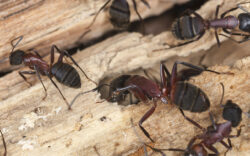If you suspect carpenter ants have invaded your property, you probably have questions. Understanding the ant life cycle and behavior can help you determine whether you have an ant problem—and when to seek help. This blog from McCall Service will give you information on the carpenter ant lifecycle, their feeding and nesting habits, and more, so you can know what to do in the case of an ant infestation in your home.
How long do carpenter ants live?
Carpenter ants have a life expectancy of six to 12 weeks as they develop from eggs to adulthood, however cold weather can extend a carpenter ant’s life cycle to as many as 10 months. Because of their short life cycle, it can take anywhere from three to six years to develop a sizable, thriving colony.
So how long do ants live without food? Although hard evidence is lacking, the general consensus is that all ant species can survive for two weeks without food and only five days without water.
What do carpenter ants eat?
We wouldn’t blame you for assuming that carpenter ants eat wood, but the fact is that they only tunnel through wood for nesting purposes. Instead, these little creepy crawlies have a varied diet that consists of the following:
- Nectar
- Larvae
- Termites
- Juices from fruits
- Liquids from plants
- Insect carcass parts
- A type of secretion from bugs called “insect honeydew”
So how long can ants live without food? If your plan of attack against an incoming onslaught of ants is to cut them off from sources of food, you may have to play a long waiting game — although hard evidence is lacking, the general consensus is that all ant species can survive for two weeks without food.
Where do carpenter ants live?
Carpenter ants generally build nests in wood. While they usually nest in decaying or damaged wood outdoors because it is easier to burrow through, they may head inside of your home in search of food. Once indoors, they build a place to work and live by building an elaborate tunnel system in the wood.
A colony’s decision to move indoors may be a sign of rotting structural wood or excess moisture in a house or building. Carpenter ants can do a great deal of damage with their tunneling habits, as it can compromise the integrity of the structure. That’s why contacting an experienced pest control team at the first sign of a carpenter ant infestation is a must.
Signs of a Carpenter Ant Infestation in Your Home
One good thing about a carpenter ant infestation is that they are hardly sneaky. You may find piles of wood shavings, called frass, near entryways and baseboards. Colonies consisting of thousands of ants are likely to make some noise, so you might hear rustling sounds coming from inside of your walls. You might even spot large dark-colored flying ants in your home.
If you see any indicators of carpenter ants in the house, take action immediately. Although an ant sighting may just indicate that they’re foraging for food, carpenter ant repairs can be too expensive to take any chances. Contact McCall Service for a free quote today — our family-run business has helped Florida families and business owners stay pest-free since 1928.



